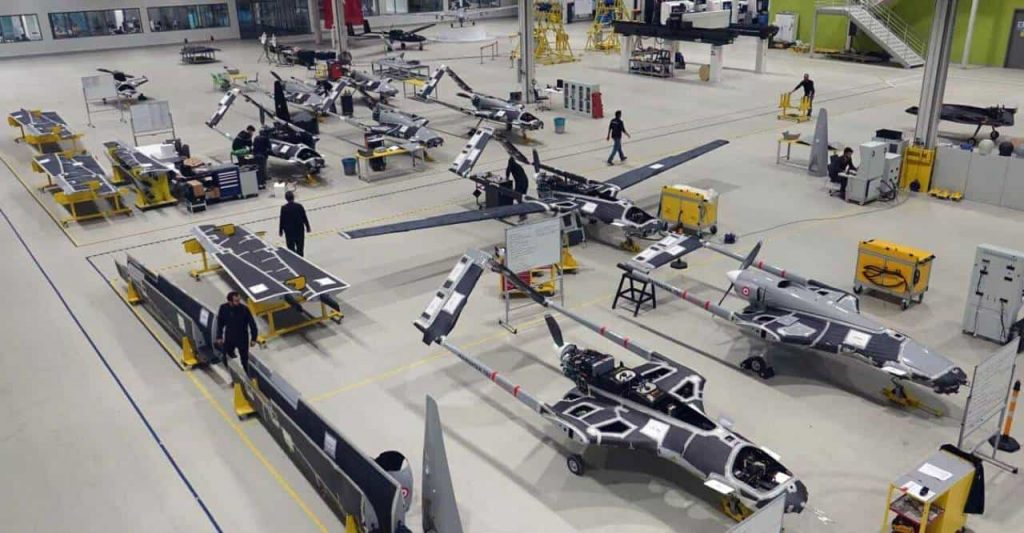

Russia announced that the Baykar’s UAV Factory into be built in Ukraine would be a “legitimate target” while NATO has called European countries to increase weapon production. The winds of war began to blow hard. Photo from Baykar production facilities.
Baykar’s Executive Board Chairman Haluk Bayraktar announced last week at the World Defense Show in Saudi Arabia, to Reuters news agency, that the TB-2 factory which is currently under construction in Ukraine would commence production within a year. The factory, to be built near Kiev, was expected to have the capacity to produce 120 drones annually, but it was yet to be determined how many would be TB-2 and how many TB-3.
Two days after this announcement, Russia issued a notable warning. According to information from Fuad Safarov’s report in Medya Günlüğü, Dmitry Belik, a member of the International Relations Commission of the Russian Parliament, speaking to Lenta.ru, stated that the Bayraktar factory would become a “legitimate target” for Moscow. Belik, who is also a member of the United Russia Party and represents Sevastopol in the State Duma, is currently under sanctions from the European Union, the United Kingdom, and Canada due to his role in the Ukraine conflict.
“Erdoğan pragmatically protects his country’s national interests by selling Bayraktar and generating revenue from Russian gas shipments to Europe through the Turkish Stream pipeline,” Belik justifies his argument.
“But we have our own goals. I want to emphasize once again that if this facility is producing military equipment, we will consider it a legitimate target,” he says.
The Russian deputy says they “cannot impose a ban on Türkiye regarding this matter” but mentions that Russia “has the right to counteract”.
What adds another layer of interest is Belik’s claim that even if Russian forces were to strike Bayraktar, it wouldn’t strain Türkiye-Russia relations. He bases this on the alleged” ability of the two countries to find common ground on many issues.”
It’s hard to consider the Bayraktar brand independently of the fact that Selçuk Bayraktar, the company’s technical director and chief designer, being the son-in-law of President Tayyip Erdogan.
Despite this, Russian politician Belik thinks it won’t have an impact on relations. He thinks that because similar instances, like Türkiye’s approval of Sweden’s NATO membership and subsequently obtaining approval from the U.S. for F-16V fighter jets, did not bother Moscow.
Dmitry Peskov, Putin’s spokesperson, calmly responded to Sweden decision that Moscow clearly found troubling saying: “It is Türkiye’s sovereign decision. Ankara has its own commitments.”
Belik’s remarks should not come as much of a surprise after both Putin and Erdoğan said “let’s not dwell on contradictions, let’s look for common points”.
On the other hand, it’s worth noting that Belik made these remarks about the possibility of targeting the Baykar’s factory when the anticipated visit of Putin, scheduled for February 12, was postponed to March 15-17 due to the Russian presidential elections.
Currently, Baykar’s factory is not the only issue between Türkiye and Russia. For example, there are outstanding natural gas debts of BOTAŞ, which Putin postponed for a year before the elections last year to avoid putting Erdogan in a difficult position. Also, there is the issue of Turkish banks “tightening” transactions for Russian citizens to avoid U.S. sanctions and the matter of the U.S. pressuring Türkiye to abandon the S-400 missile defense system in order to rejoin the F-35 program.
At this very moment, NATO Secretary-General Jens Stoltenberg has called on European member countries to produce more weapons. In an interview published on February 11 in Germany’s Welt am Sonntag newspaper, Stoltenberg cited the Republicans in the U.S. Congress blocking the budget for military aid to Ukraine as a reason. Stoltenberg, mentioning Moscow’s decision to increase military spending by 70 percent, sees it beneficial for Europe to “brace themselves” for “potentially decades of confrontation” with Russia.
The words of the NATO Secretary-General indicate that the winds of war are intensifying: He says “this means shifting from slow peacetime to high-tempo conflict production.”
Germany has been the quickest to act on this matter. The €100 billion armament budget announced by Germany following Russia’s Ukraine war is the largest since World War II.
Another factor fueling the fears of NATO’s European partners about Russia is the possibility of Donald Trump being re-elected in the U.S. presidential elections in November 2024. Stoltenberg criticizes Trump for threatening not to assist countries that do not fully pay their NATO dues even during an attack. According to NATO membership rules, countries must contribute at least 2 percent of their Gross Domestic Product (GDP) to NATO. In recent years, Türkiye, which has made advancements in the defense industry from drone manufacturing, as seen in examples like Bayraktar and TUSAŞ, to Milgem and Roketsan, has fallen below the 2 percent target, remaining around 1.3 percent in 2023.
The Russia-Ukraine war in the north, the Syrian civil war in the south, the Gaza crisis, and the struggle against the PKK are increasing the defense pressure on Türkiye.
In Turkish politics, the threat of imprisonment has reached CHP leader Özgür Özel. Presidential decrees…
The Cyprus issue has remained stuck in conceptual traps for decades, unable to move beyond…
It is understood that the meeting on June 29 between MİT President İbrahim Kalın and…
After five years, President Recep Tayyip Erdoğan had the opportunity to meet face-to-face again with…
Iranian women have been standing tall for years, not just against the regime, but also…
The U.S. Struck Iran at Israel’s Request. The U.S. launched B-2 heavy bombers from Whiteman…